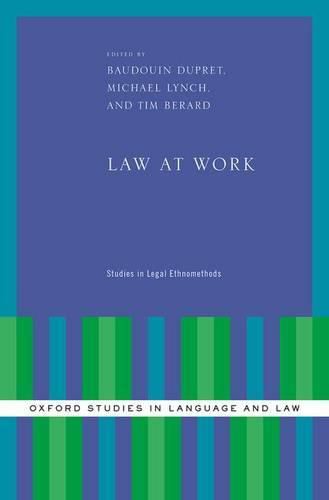Readings Newsletter
Become a Readings Member to make your shopping experience even easier.
Sign in or sign up for free!
You’re not far away from qualifying for FREE standard shipping within Australia
You’ve qualified for FREE standard shipping within Australia
The cart is loading…






The studies in this volume use ethnographic, ethnomethodological, and sociolinguistic research to demonstrate how legal agents conduct their practices and exercise their authority in relation to non-expert participants and broader publics. Instead of treating law as a body of doctrines, or law and society as a relationship between legal institutions and an external society, the studies in this volume closely examine law at work: specific legal practices and social interactions produced in national and international settings. These settings include courtrooms and other tribunals, consultations between lawyers and clients, and media forums in which government officials address international law. Because law is a public institution, and legal actions are publicly accountable, technical law must interface with non-expert members of the public. The embodied actions and interactions that comprise the interface between professional and lay participants in legal settings therefore must do justice to legal traditions and statutory obligations while also contending with mundane interactional routines, ordinary reasoning, and popular expectations. Specific chapters examine topics such as family disputes in a system of Sharia Law; rhetorical contestations about possible violations of international law during a violent conflict in the Middle-East; the transformation of a courtroom hearing brought about by the virtual presence of remote witnesses relayed through a video link; the practices through which written records are used to mediate and leverage a witness’s testimony; and the discursive and interactional practices through which authorized parties use legal categories to problems with individual conduct. Each chapter shows that it makes a profound difference to the way we understand the law when we examine its meaning and application in practice.
$9.00 standard shipping within Australia
FREE standard shipping within Australia for orders over $100.00
Express & International shipping calculated at checkout
The studies in this volume use ethnographic, ethnomethodological, and sociolinguistic research to demonstrate how legal agents conduct their practices and exercise their authority in relation to non-expert participants and broader publics. Instead of treating law as a body of doctrines, or law and society as a relationship between legal institutions and an external society, the studies in this volume closely examine law at work: specific legal practices and social interactions produced in national and international settings. These settings include courtrooms and other tribunals, consultations between lawyers and clients, and media forums in which government officials address international law. Because law is a public institution, and legal actions are publicly accountable, technical law must interface with non-expert members of the public. The embodied actions and interactions that comprise the interface between professional and lay participants in legal settings therefore must do justice to legal traditions and statutory obligations while also contending with mundane interactional routines, ordinary reasoning, and popular expectations. Specific chapters examine topics such as family disputes in a system of Sharia Law; rhetorical contestations about possible violations of international law during a violent conflict in the Middle-East; the transformation of a courtroom hearing brought about by the virtual presence of remote witnesses relayed through a video link; the practices through which written records are used to mediate and leverage a witness’s testimony; and the discursive and interactional practices through which authorized parties use legal categories to problems with individual conduct. Each chapter shows that it makes a profound difference to the way we understand the law when we examine its meaning and application in practice.